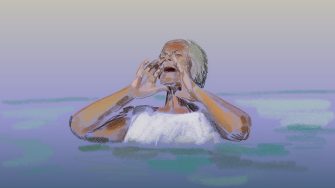Explore the new Kaldor Centre Climate Mobility Hub
The Kaldor Centre’s newly released Climate Mobility Hub is an interactive portal featuring facts, stories and evidence-based solutions relating to climate mobility.
The Kaldor Centre’s newly released Climate Mobility Hub is an interactive portal featuring facts, stories and evidence-based solutions relating to climate mobility.

As global leaders convene at COP28 to catalyse action on climate change, we are seeing more and more headlines about ‘climate refugees’.
Indeed, the impacts of climate change – rising sea levels, increasingly frequent and severe storms, flooding, fires, droughts and other disasters – are already forcing millions of people from their homes each year. Pacific leaders call climate change ‘the single greatest threat’ to their people – to their livelihoods, security and wellbeing.
But is there such a thing as a ‘climate refugee’ as a matter of law? What about people who don’t want to move? Can migration be a form of adaptation to climate change?
The new Kaldor Centre Climate Mobility Hub provides answers to these questions – and many more.
A new and dynamic digital platform, the Climate Mobility Hub brings to life practical, legal and effective responses. It amplifies voices of experience and distils decades of research from our scholars, breaking it down into bite-sized pieces. Through beautiful images, short videos, simple explainers and pathways to deeper resources, the Hub is a gateway to greater understanding of this pressing and deeply human concern.
‘At a crucial time in our collective efforts to make global and national progress on climate action, people are tuned into these challenges and hungry for understanding and solutions about climate mobility,’ says the Kaldor Centre’s Director, Professor Jane McAdam. ‘We are excited to share the Climate Mobility Hub because it answers so many of the vital questions we often receive and explains the issues in a visually engaging way.’
‘We hope that the Hub will help people understand the various dimensions of climate mobility, including why many people don’t want to leave their homes at all. The stories and videos featured from people in the Pacific highlight the complexity of the issues.’
Explore the Climate Mobility Hub for:
We invite you to explore and share this rich new Kaldor Centre resource:
Watch this video introducing the Kaldor Centre Climate Mobility Hub.
For more information contact the Kaldor Centre for International Refugee Law.